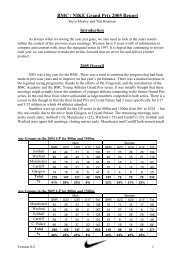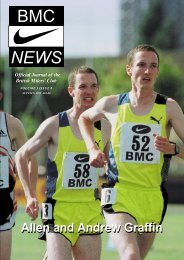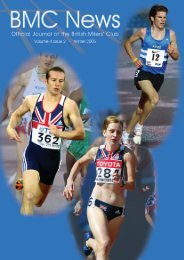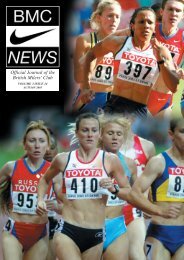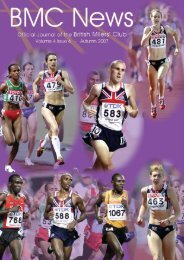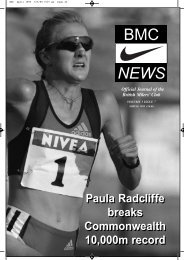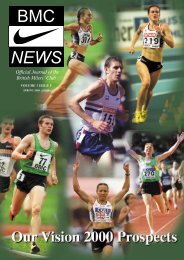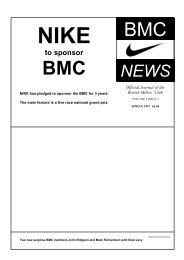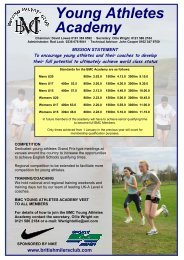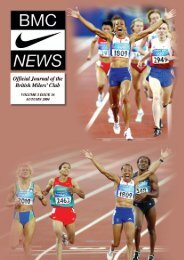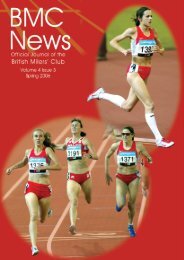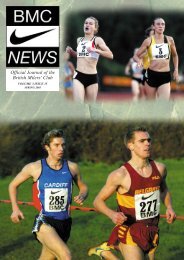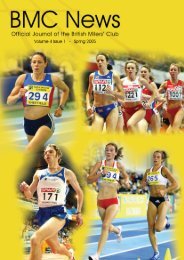BMC NEWS - British Milers Club
BMC NEWS - British Milers Club
BMC NEWS - British Milers Club
You also want an ePaper? Increase the reach of your titles
YUMPU automatically turns print PDFs into web optimized ePapers that Google loves.
A Checklist To Racing<br />
by Will Cockerell<br />
What are the ingredients to running a<br />
great race What does it take to win<br />
Well, as the famous running<br />
expression goes: "The will to win means<br />
nothing without the will to prepare."<br />
So - if it’s the best prepared who win, what<br />
does it mean to be prepared<br />
Here is a checklist of 26 questions which<br />
need to be answered before setting out for a<br />
race. A tick against all these queries, and you<br />
might just be ready to pop a good one!<br />
Are you fit<br />
If you’re entered for a race you’re one of five<br />
categories: a formula one job, a company car, a<br />
family saloon, a noisy soft-top or a smoky<br />
banger. Which one are you<br />
Are you appropriately trained for the distance<br />
to be covered<br />
Somewhat of a more subtle question this.<br />
You can be fit for sure…but that doesn’t mean<br />
that you will race well. The distance might be<br />
inappropriate to your type of fitness. American<br />
track star Steve Prefontaine realized before an<br />
Oregon track meet in April 1974 that he hadn’t<br />
got the quality work behind him to run a worldclass<br />
mile which is what the race organizers and<br />
spectators would be after. But he did have an<br />
excellent base, and asked instead for a 10,000m<br />
to be added to the programme. His request was<br />
granted and he duly recorded an American<br />
record of 27:43 - the sixth fastest of all time up<br />
till then. But would he have run such a good<br />
mile He believed not.<br />
Are you healthy<br />
The fitter you are the more vulnerable you<br />
are, since one’s cells are at their most permeable<br />
at peak fitness. Seb Coe knows all about this.<br />
In his 12 years of top flight competition with a<br />
possible 12 major championships to compete at,<br />
he was able to attend just 7 - of which four then<br />
threw up abnormally cold weather, two of with<br />
then striking him down with flu.<br />
ARE YOU TAPERED<br />
The mystical magic taper. Racing with tired<br />
legs is no fun. So, how should you feel when<br />
you’re tapering down for a race Sticking with<br />
Coe, sports physiologist David Martin recalls:<br />
"Cutting back to 60 miles a week and then to 30<br />
miles a week, Seb would get so fresh he didn’t<br />
know what to do with himself when he got on<br />
the track to run. You run like a feather, and<br />
that’s fun. You get a thrill, and think, this is nice.<br />
Run and win, and get the rush. Nothing ever<br />
beats the rush of victory."<br />
Are you well-rested sleep-wise<br />
It’s rare to race well on a sleep deficit. There<br />
are three great rules regarding sleep:<br />
• The night before before the race is of far<br />
greater importance than the night before.<br />
• An hour’s sleep before midnight is worth two<br />
after it.<br />
• If you want to fly with the eagles by day, you<br />
can’t flop with the turkeys by night.<br />
Are you fed Just the right amount And<br />
content<br />
Some runners go for the big fry up before a<br />
big race - others for a solitary boiled egg and no<br />
more. Very much a personal thing, whatever<br />
works for the individual athlete. A typical day’s<br />
diet for four-time Olympic medallist Mohamed<br />
Gammoudi consisted of five yogurts, ten pieces<br />
of fruit, four cups of tea, two coffees, two<br />
pastries, large quantities of meat, fish, milk, and<br />
cheese, and as much parsley as he could eat. He<br />
weighed 135 pounds.<br />
It’s probably correct to say Gammoudi ate<br />
somewhat less on race days, but one key rule is:<br />
stick with what you know! Author Tom<br />
Derderian tells a tale that many runners will<br />
empathize with - the sort of nightmare that noone<br />
wants to go through, about a certain<br />
youngster in the 1967 Boston Marathon:<br />
It seems that the night before the youngster<br />
had eaten some apple butter that during the race<br />
desperately wanted to escape from his body. He<br />
had to stop at a service station. The restroom<br />
was locked. Time ticked away. He had to ask<br />
an attendant for the keys. He took the keys in<br />
his drizzle-numbed hand and fumbled at the<br />
locks. Time ticked. At last he slipped in, and<br />
then quickly he was out and running down the<br />
road. He passed runners he had passed earlier.<br />
Five miles later it happened again. Again the<br />
same frozen-fingered fumbling. Again he<br />
passed the runners he had passed twice before.<br />
All in all he lost 5 minutes to the apple butter.<br />
The runner was Ambrose Joel Burfoot. And he<br />
would be back.<br />
He would indeed: Burfoot, now one of the<br />
world’s leading running authors, returned to win<br />
the Boston Marathon the following year -<br />
minus, one assumes, the exotic apple butter.<br />
Has this food had time to digest<br />
Two hours is the general rule. One can thus<br />
take pity with Frenchman Joseph Guillemot at<br />
the Antwerp Olympics of 1920. On the day of<br />
the 10,000m Guillemot had just finished a large<br />
20<br />
<strong>BMC</strong> News : Spring 2001



